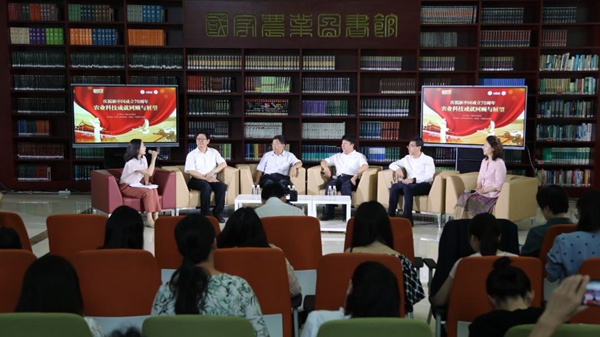Forum focuses on agricultural technologies
- By Yuan Fang
 0 Comment(s)
0 Comment(s) Print
Print E-mail China.org.cn, September 12, 2019
E-mail China.org.cn, September 12, 2019

Yuan Longping, a Chinese agronomist known as the "father of hybrid rice," made another breakthrough last year as his team successfully grew rice in Dubai's desert areas with a top yield of 500 kilograms per mu.
Yuan's success in Dubai illustrates how agricultural technologies can transform agricultural production.
In China, a country that has managed to feed its 1.4 billion people with a level of per capita arable land area far below the world average, the role of agricultural technologies is undoubtedly also very evident.
As this year marks the 70th anniversary of the People's Republic of China (PRC), agricultural technology experts gathered at a forum in Beijing Wednesday to review the achievements in agricultural technologies since the PRC's founding in 1949 and look to the future.
Scientific and technological advances now contribute to nearly 60 percent of China's agricultural growth, said Wan Jianmin, a member of the Chinese Academy of Engineering and vice president of the Chinese Academy of Agricultural Sciences (CAAS), when speaking at the forum.
As a key player in organizing, leading and driving China's agricultural technology research and application, CAAS now hosts two national key science facilities - the National Key Facility for Crop Gene Resources and Genetic Improvement, and the National Center of Agricultural Biosafety.
CAAS will stay committed to innovation in ensuring food security, protecting the environment and increasing resources utilization efficiency, said Wan.
In response to a question regarding rice varieties, Wan, a prominent expert on rice breeding, said research has gone from simply focusing on how to raise yield and quality to also catering to various consumer needs such as those of diabetics and lung disease patients.
Speaking of China's international cooperation concerning agricultural technology, Mei Xurong, also CAAS vice president, said that so far, China has reached cooperation agreements with 140 countries and regions as well as international organizations.
While introducing advanced foreign technologies, China is also seeing its own agricultural technologies going out and being applied abroad in recent years, Mei added.
Mei also noted that China is increasingly participating in international agricultural technology governance, expecting China to play a bigger role in the future and become a rules setter instead of simply a game player.
When giving a detailed introduction about the National Key Facility for Crop Gene Resources and Genetic Improvement, Liu Chunming, director of CAAS' Institute of Crop Sciences, revealed that China is building a new seed bank that is set to be the world's largest with a designed storage capacity of 1.5 million seed samples, given that its current seed bank, with a capacity of 500,000 samples, is no longer sufficient.
Sun Tan, director of CAAS' Agricultural Information Institute, discussed the trending concept "Smart Agriculture" at the forum.
Sun believed that "Smart Agriculture," featuring the use of artificial intelligence, big data and cloud computing technologies, has the potential to make agricultural technology research more flexible and advance at a faster speed, and help agricultural growth cut costs, improve quality and increase efficiency.
Wang Jing, a professor with CAAS' Institute of Quality Standard and Testing Technology for Agro-Products, said her institute has formulated nearly 300 standards to ensure the quality and safety of agricultural products.
Wednesday's forum was the third of a series of dialogues between scientists and journalists to communicate science, organized by the China Association for Science and Technology.






Go to Forum >>0 Comment(s)